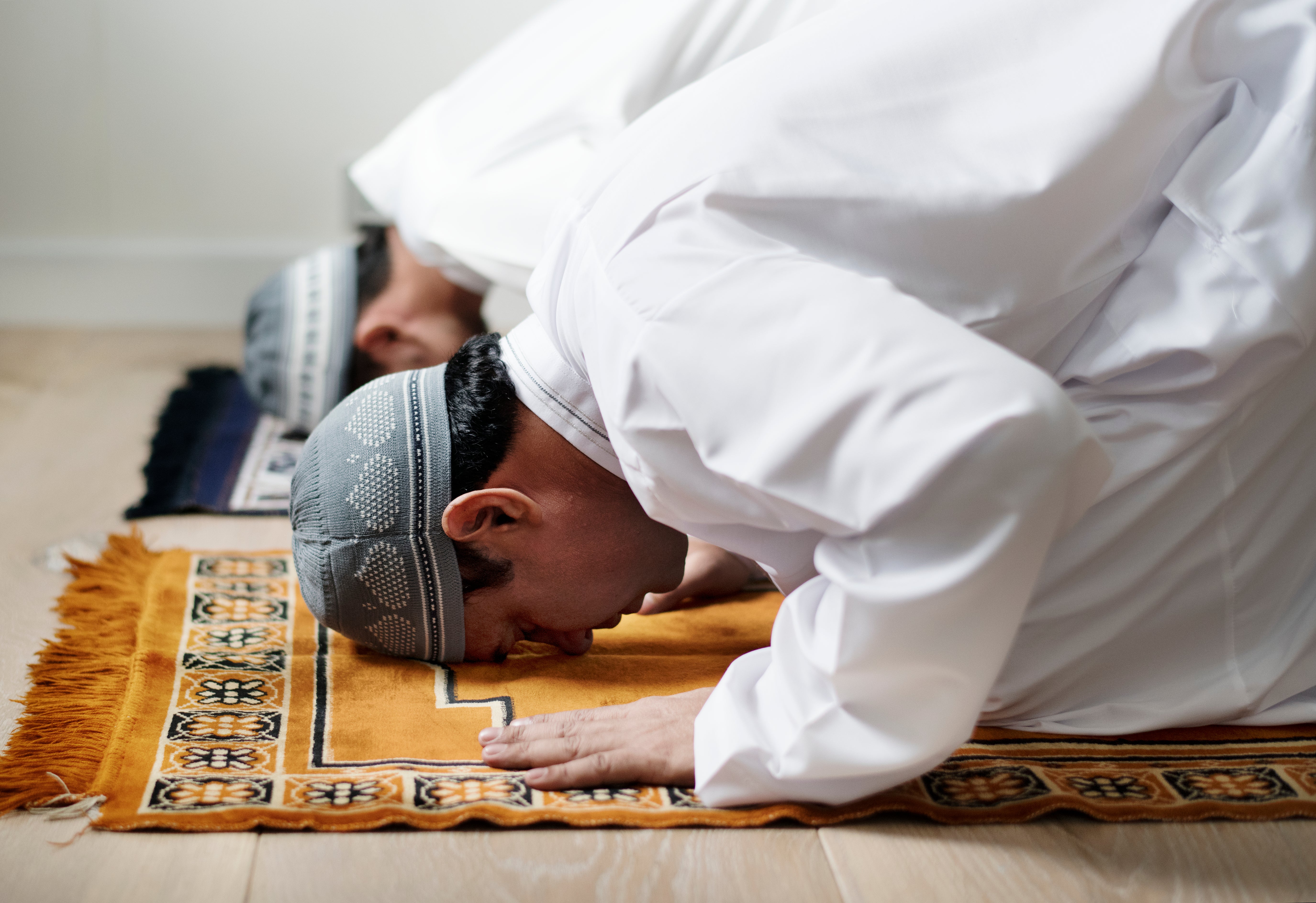The Independent's journalism is supported by our readers. When you purchase through links on our site, we may earn commission.
‘I can’t explain how excited I am’: New Muslims on how they will celebrate their first Eid
With continued restrictions on celebrations due to the pandemic, recently converted Muslims tell Saman Javed how they plan to mark the occasion


As Ramadan draws to an end, Muslims across the world will be celebrating Eid al-Fitr from Thursday to Friday. For my family, this means attending the morning Eid prayer at a local mosque before spending the day eating a feast of all our favourite Pakistani dishes after a month of fasting.
While Eid is a cause for celebration, it is also a sad goodbye to the holiest month in the Islamic calendar, one which Muslims look forward to every year. There’s a sense of peace in the simplicity of Ramadan, which forces Muslims to rely on the sun to tell us when we can and can’t eat.
With the absence of meals during the day and an increased focus on prayer, my usually busy family home is tranquil. It forces us to come together, eating both the evening meal, which breaks our fast, and the pre-dawn meal together around the dinner table. In this way, Ramadan provides a sense of oneness that evades my family for the rest of the year.
Born into a Muslim household, I am accustomed to spending every Ramadan like this, but there is a whole community of new Muslims – who often describe themselves as reverts – who do not have this birthright.
While the UK Census does not record how many people join Islam each year, a report by the University of Cambridge, published in 2016, predicted there are between 50,000-80,000 converts in the UK adult population. They make up just four per cent of the total Muslim population, making them “a minority group within a minority group”.
Having reverted to Islam in December 2020, Samantha Ward, wants to go “all out” for her first Eid celebration. Newly married to a Pakistani Muslim, Ward wants to celebrate as much as is possible with the current Covid restrictions on indoor mixing.
I’m really looking forward to dressing up, eating good food and spending time with my family
Pre-pandemic, her husband’s family and extended family would gather at one house for a huge feast, not too dissimilar to how she celebrated Christmas growing up. This year they’re scaling it back.
“I’m really looking forward to dressing up, eating good food and spending time with my family,” she says. “The dish I’m looking forward to eating the most is this lamb curry that my mother-in-law makes, it’s amazing. I’m also looking forward to cooking with her as well.”
Prior to becoming Muslim, Ward had attempted to fast during Ramadan 2020 but struggled alone. “This year the whole vibe is different because I’m doing it with other people, it makes it easier. Although I struggled the first week; I was constantly hungry, grouchy, and had headaches, since then I’ve felt so much better,” she says.
During her teenage years, Ward suffered from depression and alcoholism. “I was completely lost. I had suicidal tendencies and had planned to take my life,” she says.
Since finding Islam, she now feels she has the strength to better deal with her mental health issues. “Studying Islam taught me there are people out there who are suffering so much more than I am, and I feel so blessed to have everything I’ve got.”
Others are looking forward to celebrating Eid, but will be spending the day with friends rather than extended family. Rakiim Huang took the Shahadah [the Muslim declaration of faith] on 8 March this year, despite, he says, his parents being against his decision.
“The reason we call ourselves reverts is that, in Islam, we believe everyone was previously a Muslim. When I was born, I was a Muslim, but I was born into a non-Muslim family and raised that way, and now I’m coming back to that,” he explains.
I can’t explain how excited I am. I’ve already got two new outfits
Having now marked his first Ramadan as a Muslim, Huang can barely contain his excitement for Eid. Still living at his family home, Huang will not be celebrating Eid with his family but with close friends who also practice Islam.
He plans to go to one of their family homes for a feast, and to play football. “I can’t explain how excited I am. I’ve already got two new outfits, one to wear to Eid prayer and then another to wear to my friend’s house,” he says.
Huang has been sharing his journey with his community of 257,000 followers on TikTok. “My friends and people on TikTok support me so much. I feel so blessed. I’ve got a beautiful support network around me,” he says.

Alessia Weerasinghe only joined Islam on 24 April. Weerasinghe, who lives in a house share with friends says the pandemic has given her ample time to explore the religion without distraction.
Born to Sri Lankan parents, Weerasinghe’s family first immigrated to the UK 12 years ago from Italy. To deal with her loneliness during lockdown she found herself praying more often before finally making the decision to convert.
The latest figures from the Office of National Statistics, showed between April and May 2020, five per cent of adults felt lonely “often” or “always” and this increased to seven per cent between October 2020 and February 2021.
Like Huang, she says her family do not completely approve of her choice. “We have this agreement where we just don’t talk about it and have our own faiths. If I go back to her [her mother’s] house, I won’t show her I’m praying, and she won’t force her beliefs on me.”
Regardless of the tensions Weerasinghe has been looking forward to celebrating Eid, after spending much of Ramadan quite isolated, breaking fast alone in her bedroom and seeing a friend once a week for iftar.
“[For Eid] I’m planning to do a picnic with my non-Muslim friends, but the weather forecast is not looking good,” she says. “I’m quite nervous because I don’t want to be sitting home alone on my first Eid,” she says.
For new Muslims like Weerasinghe who might feel alone, there are dozens of support services that are available across the country, many of which are organising online events via Zoom for Eid.
I’m planning to do a picnic with my non-Muslim friends, but the weather forecast is not looking good
Amanda Morris, a community liaison officer at Muslim Council of Britain also heads up the Cardiff New Muslim Club, which offers one-to-one mentoring. This pairs new Muslims with someone who converted a long time ago, who understand the journey, and can help them navigate challenges.
“If you’re white, you’re going from being in the majority to being a minority population, which can have a mental health impact as most people don’t consider this when looking into the religion,” she says, adding that this is particularly true among women.
“If we choose to wear the hijab, we clearly mark ourselves out as being part of a religious minority community. You can go from having a very privileged life and not ever experiencing any racist attitudes, to suddenly walking down the street and having people shout at you.”
For those who have faced difficulties because of their Islamic faith, Eid also provides a time for celebration. Yazmeen Brown, a mother of two, converted to Islam eight weeks ago and is the only Muslim in her village.
“I have actually faced people throwing bacon at my house and calling me names. I don’t go out with my hijab in my village just yet, because if people are willing to do that to my house, I’m nervous about how they might treat my children,” she says.
During Ramadan Brown has found a community online, joining groups of women who have also started fasting for the first time. For Eid she will be celebrating at home.
“I’ve bought a new Abaya to wear for Eid. I’d like to spend the day with other Muslims but I’m more than likely to spend it at home with my children,” she says, adding that she will be putting up decorations to mark the day.
For the small number of Muslims who chose to join the faith in adult life, Eid provides a moment of celebration and community. Despite facing challenges including abuse and family tensions, many are able to lean on friends or find haven in their local mosque or community groups where they are welcomed with open arms.
Join our commenting forum
Join thought-provoking conversations, follow other Independent readers and see their replies
Comments
Bookmark popover
Removed from bookmarks